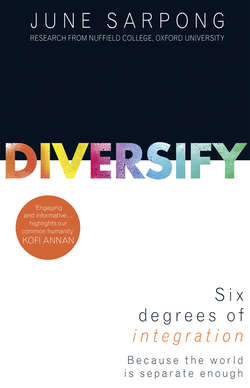Читать книгу Diversify: A fierce, accessible, empowering guide to why a more open society means a more successful one - June Sarpong, June Sarpong - Страница 10
ОглавлениеThe Old Way
Making up slightly more than half of the world’s population, women are probably the largest ‘other’ group – but it’s the ‘other’ man that I want to discuss first.
If you genuinely want to identify and understand the ‘other’ man (and the fact that you have chosen to read this book gives me confidence that you do), he is not hard to find. The ‘other’ man is a diverse group found across the Western world in working-class communities, blue-collar jobs, and weekend football matches. These are the men I was raised by and raised with. They have been taught from a young age not to cry, not to be a sissy, and to stand up for themselves. They are more likely to have been celebrated by their peers and perhaps even their teachers for their physical prowess than their mental agility. This other man is black, Muslim, or white working class, and each group is the victim of their ‘otherness’ in a different way. But each will have been taught early on to understand the importance of a man being able to provide for himself and his family – and each will have encountered barriers in trying to achieve this.
Discrimination against men is important to address because of the impact it has on the rest of society. The exclusion of the ‘other’ man can often have violent and devastating consequences. This isn’t always the case, obviously, but men have a different way of dealing with fear and frustration to women, as does each person to the next. Some of this is due to socialization, but some of it is pure biology. Leading neuroscientist Dr James Fallon explained to me that our genetics can result in striking differences in our response to stress, abuse, and rejection: ‘People with “vulnerability” forms of genes are extremely impacted … while those with highly “protective” [genes] are remarkably resistant.’ This suggests that some people are genetically more likely than others to develop damaging responses to environmental stressors, such as depression, PTSD, substance abuse, and personality disorders. And, says Dr Fallon, ‘males often [have] poorer mood and personality outcomes than females’. So men are in fact more vulnerable to exclusion than women, and no man – no matter how much he may have been taught to suppress his emotions – is immune to its effect.
We’ve seen this in action throughout the UK and US in recent years. The failure of these societies to prevent the economic and social exclusion of their ‘other’ men has weakened and divided communities, and created a ticking time bomb that we must deactivate. It has caused feelings of inferiority and led to a fractured society. It has compromised social mobility and created artificial bubbles whereby the situation you are born into dictates your job and educational prospects. It has opened the doors to radical groups, and nurtured breeding grounds of extremism. In short, it has led to a lack of diversity, which then leads to a lack of empathy on both sides: cue demagogues fanning the flames of division for political ends.
For it has been the exclusion of the ‘other’ man with muscle where it still counts – at the ballot box – that has had the most profound implications. In the UK, the white working-class male vote delivered the shattering of Britain’s 40-year union with Europe; in America, it brought the election of Donald Trump, a President with zero experience in public office and some unsavoury views and conduct. Whatever your opinion on either Brexit or Trump, 2016 provided the two most extreme examples in recent history of how a marginalized group can dictate the social and economic future of society.
And of course, politics aside, the exclusion of any ‘other’ man impacts more than just him. His family will share the impact of his pain – sometimes literally, if alcohol and low self-esteem are part of the toxic mix. This scenario played out within a family has a multi-generational impact, and can cost the state millions of pounds in welfare and social services professionals, called in to address family breakdown and deprivation. Failing to diversify and include all ‘other’ men is not something we can afford economically or socially. Quite simply, it will cost a lot less – financially, but also in pain and suffering – to expand opportunities to the ‘other’ man rather than continue to exclude him.
While preparing to write this book, I wrote to three such ‘others’: prisoners in the UK with strikingly similar stories; young men – one black, one Muslim, one white working class – who all once had dreams that turned into nightmares. You will find their letters in response to mine at www.Diversify.org. I read their personal accounts of how life had taken them on a path that led to prison, a powerful line from philosopher Susan Griffin’s A Chorus of Stones: The Private Life of War kept running through my mind: ‘“There is a circle of humanity,” he told me, “and I can feel its warmth. But I am forever outside.”’ And this ‘circle of humanity’ excluded for them behind bars, too: The Young Report of 2014 found that: ‘Most of the prisoners, said that they experienced differential treatment as a result of their race, ethnicity or faith. Black prisoners felt that they were stereotyped as drug dealers and Muslim prisoners as terrorists.’
These three young men may not possess the tools to express themselves as eloquently as Griffin’s subject, but their words of despair and hopelessness are no less powerful. They are men who, thanks to mass social media and globalization, knew what bounties the modern world had to offer, yet felt that they and their kind were not wanted, valued, or needed. Is it any wonder they ended up where they did?
